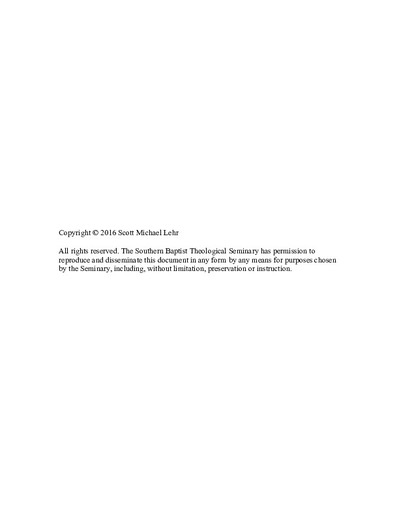The High Cost of Leadership: Equipping Leaders for Loss
Abstract
ABSTRACT
THE HIGH COST OF LEADERSHIP:
EQUIPPING LEADERS FOR LOSS
Scott Michael Lehr, D.Min.
The Southern Baptist Theological Seminary, 2016
Faculty Supervisor: Eric B. Geiger
Chapter 1 describes the high cost of leadership and the difficulty of ministry through both quantitative and qualitative research. In ministry, there will be loss, but the good news is that the ministry leader has the opportunity to choose what to lose. The rationale for this project is that while the statistics are overwhelming, the experiential battles are even worse. Therefore, every future ministry leader must be equipped for what is surely to come.
Chapter 2 debunks the myth that one can have it all in ministry or life. In this chapter, I begin looking at the book of Philippians and what the apostle Paul taught his most beloved church and their leaders about loss in ministry. Here one learns that loss is life for the leader, that one must chose to lose the right things and not the wrong ones, that loss begins as part of the work that God begins at the point of salvation, and that there is great freedom found in loss.
Chapter 3 continues the study of loss in the book of Philippians, looking at the loss of self. The chapter starts by discussing why ministry leaders leave and then proceeds to discuss the need to lose selfish ambition and vain conceit while looking at the four examples that Paul gives in Philippians 2 of those who were selfless.
Chapter 4 walks the future leader through Philippians 3, where Paul says that he considers everything a loss in comparison to the surpassing greatness of knowing Christ Jesus as Lord. One discovers here that false promises lead one on false pursuits and that the ministry leader must be willing to lose it all except the one thing he needs, namely Christ.
Chapter 5 looks at the final chapter of the book of Philippians and the anxiety that surrounds loss. The future leader discovers that true peace and contentment comes from finding Christ. The chapter concludes with applications for pastors, churches, and areas of further study that could be explored regarding ministry leaders and loss.

